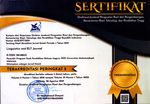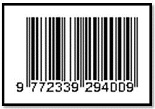Gender in Power: Breaking Boundaries on Little Mix's "Power"
Abstract
Keywords
Full Text:
PDFReferences
M. Nilsson, “Breaking Gender Roles and Gaining Agency,” Lunds universitet, Lund, 2013. [Online]. Available: https://lup.lub.lu.se/student-papers/search/publication/3798429
L. A. Kanu and G. I. Nnamdi-Eruchalu, “Misogyny in the Lyrics of Selected Nigerian Hip-Hop Songs: A Stylistic Analysis,” Awka Journal of English Language and Literary Studies (Ajells), vol. 10, no. 1, p. 164, Dec. 2023, [Online]. Available: https://journals.unizik.edu.ng/ajells/article/view/3193
A. Rambe, R. Rangkuti, and M. Manugeren, “Feminist stylistics content in the novel women crying to the black moon by Dian Purnomo,” International Journal of Multidisciplinary Research and Growth Evaluation, vol. 03, no. 03, p. 638, 2022, doi: 10.54660/anfo.
P. Simpson, Stylistics, 1st ed. New York: Routledge, 2004. [Online]. Available: https://books.google.com/books?hl=id&lr=&id=21-aRiC9sZkC&oi=fnd&pg=PP14&dq=Stylistic+paul+simpson&ots=yWHYF95tYN&sig=sUgO8oOmrZ3zV-tVtfitL7zcop8
R. Rangkuti and S. Hafifah, “Feminist stylistic analysis and LGBTQA+ representation in Lady Gaga’s born this way,” JOALL (Journal of Applied Linguistics and Literature), vol. 7, no. 1, pp. 276–290, Feb. 2022, doi: 10.33369/joall.v7i1.20044.
S. Mills, “Interface Feminist Stylistics,” in Feminist Stylistics, 3rd ed., R. Carter, Ed., London: Routledge, 1995, ch. 1.
Z. Rahimnouri and A. Ghandehariun, “A Feminist Stylistic Analysis of Doris Lessing’s The Fifth Child (1988),” Journal of Language and Literature, vol. 20, no. 2, p. 222, 2020, doi: 10.24071/joll.v20i2.2586.
A. Zahra Tarigan, C. U. Basa Tambunan, L. Melati, S. Mentari, and R. Rangkuti, “Linguistics and English Language Teaching Journal Feminist Stylistic Analysis of Bella Poarch’s Song ‘Build A Bitch,’” Linguistics and English Language Teaching Journal, vol. 11, no. 2, pp. 119–122, Dec. 2023, doi: 10.31764/leltj.v12i1.24103.
Y. Pebrianti Caroline, T. Zahrani, M. Riyadhil Sitompul, and R. Rangkuti, “A Feminist-Stylistic Analysis of the Taylor Swift Song Entitled the Man,” KLAUSA: Kajian Linguistik, Pembelajaran Bahasa, dan Sastra, vol. 7, no. 2, pp. 115–118, Dec. 2023, doi: 10.33479/klausa.v7i2.881. Women Empowerment through Song Lyrics: Feminism Perspectives Of Katy Perry’s Roar
N. Neisya, F. Aprilia, A. N. S. Darlius, and F. Lestiana, “,” Indonesian EFL Journal, vol. 9, no. 1, pp. 11–18, 2023, doi: 10.25134/ieflj.v9i1.6642.
N. Kurniawati, “Representation of Black Women Power in Beyoncé Knowless’s ‘Run the World (Girls),’” E-Structural (English Studies on Translation, Culture, Literature, and Linguistics, vol. 4, no. 1, Jun. 2021, [Online]. Available: http://publikasi.dinus.ac.id/index.php/estructural68
A. A. Muhammad and N. Nafisah, “Women Stereotype in K-pop Girl Group Songs,” Repository UPI, Feb. 2020.
J. W. Creswell, Qualitative Inquiry & Research Design, Third Edition. SAGE Publications, Inc, 2013.
S. B. Merriam and E. J. Tisdell, Qualitative Research, Fourth Edition. John Wiley & Sons, Inc, 2009.
N. R. AWAD, “Feminist Stylistics in Ahdaf Soueif’s Aisha,” Sosyal Bilimler Dergisi Journal of Social Sciences, vol. 33, no. 3, p. 1095, 2023, doi: 10.18069/firatsbed.1260193.
A. Sajad, F. U. Rehman, and M. Nawaz, “A Feminist Stylistic Analysis of Umm-e-Rumman Syed’s Selected Poems in Beautiful Inadequacies,” The Regional Tribune, vol. 3, no. 1, p. 143, 2024, doi: 10.63062/trt/V24.030.
S. Mills, Language and Sexism. Cambridge: Cambridge University Press, 2008. doi: 10.1017/CBO9780511755033.
C. Artanti, A. Y. Zulaika, and R. Rangkuti, “Women Empowerment in Little Mix’s ‘Salute’: Feminist Stylistic Analysis,” Titian: Jurnal Ilmu Humaniora, vol. 7, no. 2, pp. 384–399, Dec. 2023, doi: 10.22437/titian.v7i2.29556.
M. A. K. Halliday and C. M. I. M. Matthiessen, An Introduction to Functional Grammar, Third Edition. London: Routledge, 2004.
R. Katawazai, W. K. Monib, M. S. Hassanzoy, Z. Quvanch, and N. A. Mohd Omar, “Halliday’s Systemic Functional Linguistics (SFL) Approach and Sports Texts of the Postgraduate Students at Universiti Teknologi Malaysia,” Sains Humanika, vol. 13, no. 3, pp. 25–26, Aug. 2021, doi: 10.11113/sh.v13n3.1822.
N. A. G. Al-Zubaidi, “Woman Stereotypes and Patriarchal Hegemony: A Feminist Stylistics Analysis of Iraqi Folk Proverbs,” AL-USTATH, vol. 58, no. 1, p. 72, 2019, doi: 10.36473/ujhss.v58i1.836.
Supriyadi, “Masculine Language in Indonesian Novels: A Feminist Stylistic Approach on Belenggu and Pengakuan Pariyem,” Humaniora, vol. 26, no. 2, p. 227, 2014, doi: 10.22146/jh.v26i2.5244
DOI: https://doi.org/10.31764/leltj.v13i1.30391
Refbacks
- There are currently no refbacks.
Copyright (c) 2025 Debora Anriyani Simamora, Candrika Galaska, Jessicca Maria, Rahmadsyah Rangkuti

This work is licensed under a Creative Commons Attribution-ShareAlike 4.0 International License.
_____________________________________________________
Linguistics and ELT Journal
p-ISSN 2339-2940 | e-ISSN 2614-8633

LELTJ is licensed under a Creative Commons Attribution-ShareAlike 4.0 International License.
_____________________________________________________
LELTJ is abstracting & indexing in the following databases:
_____________________________________________________
LELTJ Editorial Office:













